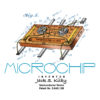The Story
It seems that the integrated circuit (IC), also known as the microchip or chip, was destined to be invented. In 1958, two separate inventors, unaware of each other’s activities, invented almost identical ICs at the same time.
It had been a quantum leap in history from the vacuum tube to the transistor. However, a better and more efficient way of connecting electronic components such as transistors together became the next necessity.
In 1958, Jack Kilby, working at Texas Instruments came up with the idea and process of making all of the components and the chip out of the same material: germanium. At the same time Robert Noyce, working at Fairchild Semiconductor, came up with a similar idea except he used silicon as a semiconductor material and his process was more sophisticated. Silicon became the preferred material and today we use some of the same principles to build chips with over a billion transistors on them. Both men were granted patents on their inventions.
The chip placed all these components together on a single semiconductor unit. It made obsolete the laborious and expensive task of interconnecting multiple electronic components. It shrunk the size and cost of making electronics, and impacted future designs of all computers and other electronics. Jack Kilby said, “What we didn’t realize then was that the integrated circuit would reduce the cost of electronic functions by a factor of a million to one; nothing had ever done that for anything before.”
Both Kilby and Noyce were granted patents on their invention and today are acknowledged as joint-inventors of arguably the most important and far-reaching technology in the 20th century. Noyce went on to co-found Intel with Gordon Moore, and to develop the microprocessor in 1974.
Kilby was awarded the Nobel Prize in Physics in 2000 for his work on the IC, long after he had also co-invented the hand-held calculator. Kilby died just five years later, in 2005. Noyce would have undoubtedly shared the prize, but he had already passed away, in 1990. (The Nobel Prize is rarely awarded posthumously).
One can hardly help wondering, if germanium had become the material of choice for the semiconductor, would Silicon Valley be Germanium Valley instead?











